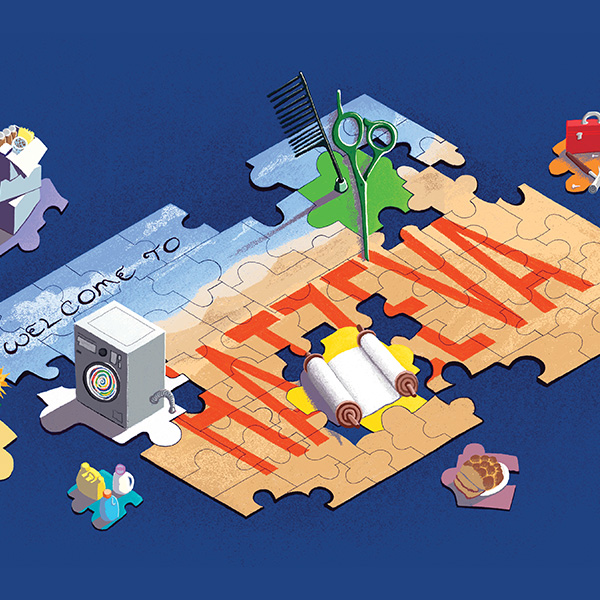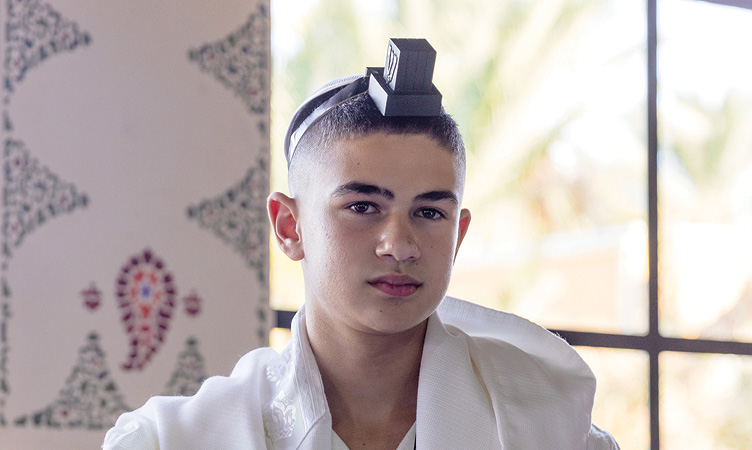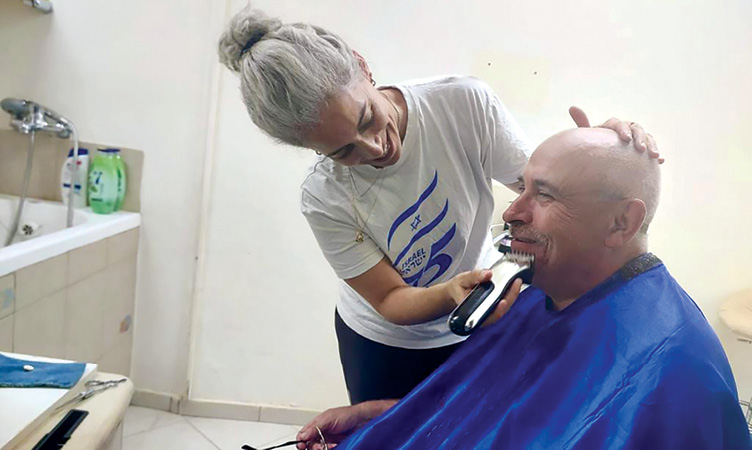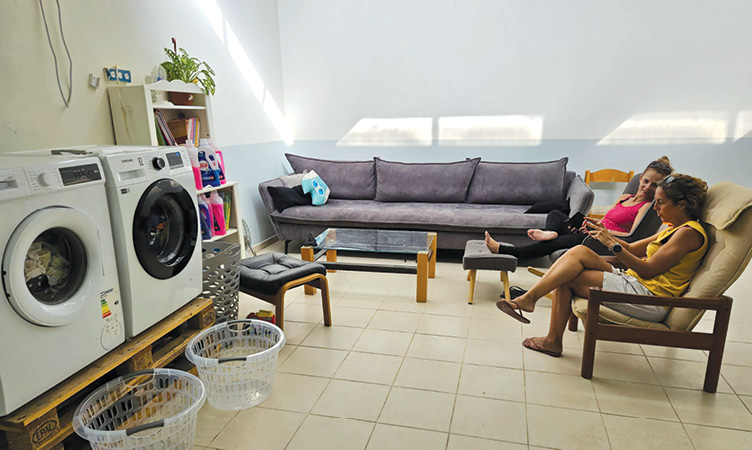In the wake of the October 7 massacre and the ongoing war against Hamas, Israel and the Jewish people have united like never before. The town of Hatzeva, in the Arava, a proud partner of Jewish National Fund-USA’s work in developing the Negev, stands out as a shining example of Zionist unity.
Home to just 800 residents, Hatzeva suddenly became the destination for 350 evacuees from the region of Israel hardest hit by Hamas’ attack. Remotely located and surrounded by uncertainty, the people of Hatzeva, with Jewish National Fund-USA’s support, succeeded in organizing themselves to care for the new arrivals.
From donating clothes to organizing a free supermarket for evacuees stocked with staples, to arranging community meals for over 300 people, to providing relief and respite activities for evacuated children, Hatzeva and Jewish National Fund-USA mobilized together to meet every physical and emotional need.
“The most beautiful part in this heartbreaking situation is actually how absorbing the evacuees made us stronger as a community,” said Tania Pons Allon, a resident of Hatzeva and an employee at Jewish National Fund-USA. “The Arava became a haven for so many, and we were grateful we could be there for so many broken communities.”
The following are three stories of courage and light from Hatzeva.
Coming of Age
Itamar Cohen’s Bar Mitzvah celebration, a festive occasion, had been scheduled for October 19, but there was debate over whether the event should be postponed—not just because the family was far from their home, relocated to Hatzeva, but more so because they had lost so many friends and family members to the atrocities of October 7. How could they celebrate? Who would even be able to attend?
Itamar and his family decided to move forward, but there still remained a question: How would they pay for it?
The people of Hatzeva stepped up. Suppliers donated goods and services free of charge: catering, photography, flowers, lights and sound, furniture. Dishes were loaned out and locals cooked food. Volunteers and heartfelt generosity turned the Bar Mitzvah from a question to a celebration.
This Bar Mitzvah symbolized the family’s and other evacuees’ ability to rise from grief and devastation and demonstrated their steadfast faith in Jewish tradition.
In the end, the Bar Mitzvah was not the raucous celebration that most 13-year-olds enjoy, but it was a heartfelt expression of pride and unity, and Itamar felt honored to receive so much thoughtful care for this milestone.
Itamar’s mother, Adva Portal, shared her thoughts at the event, “Ironically, this week’s Parasha is about Noah, and the flood erasing life on earth. After the rain, the dove with the olive branch represents the end of evil and a new beginning. We are all hopeful to see a dove on the horizon which will mark the rebuilding of our homes, souls and hearts. Dear people of Hatzeva that became our family since October 8: you are the olive branch that the dove has brought us.”
The Laundry Room
Among the myriad of big questions that surrounded the evacuees’ lives immediately following their displacement, there were also practical matters to take care of. For one thing: how would they manage to do laundry for their families? For those relocated to Hatzeva, this was one of the first challenges that was tackled by a combination of national resources, civic initiative, and local imagination.
With Jewish National Fund-USA’s help, Hatzeva received and contributed washing machines for the cause. They found an old shuttered daycare that stood empty and refitted it into a laundromat. The challenge then became finding water outlets and enhancing the electrical capacity to withstand the amount of energy being used – and again members of the community volunteered to assist. The local electrician rewired the space and the town’s water maintenance team added plumbing.
For the first few days of the laundromat’s operation, most of those who arrived were tired mothers—who largely have husbands either remaining on their farms back home to protect their fields and ensure Israel’s food security, or serving in the army on reserve duty. The residents of Hatzeva noticed that the laundry room was becoming a place of respite, and they added a coffee station with sweets, a couch, and chairs, converting the laundromat into a place to relax. The vacant daycare-turned-laundromat was transformed into a therapeutic place of rest.
The laundromat is open round-the-clock and is staffed by elderly members of the community who have now found a new purpose in their daily routine, a new productive outlet for their time and youthful energy, and a way to help fellow Israelis in need.
Orit the Hairdresser
“Yesterday I became a hairdresser,” Orit Bar Am wrote to her Facebook page on October 14.
Many Israelis have taken on new roles to meet the country’s evolving needs in the aftermath of October 7. Orit from Hatzeva also took her place as an unexpected volunteer.
Before October 7, Orit had some experience cutting children’s hair around the neighborhood. After October 7 and the influx of evacuees, a need developed for haircutting and Orit jumped at the opportunity.
“I will do whatever it takes, whatever takes me away from the screen and can do good, I’m on it,” she said.
She set up an improvised barber shop in the washing room of the daycare-turned-laundromat.
“The pastel colors on the walls and the scent of laundry detergent relax me.”
Orit cut Itamar Cohen’s hair, and his father’s, in preparation for Itamar’s Bar Mitzvah celebration.
Aside from the practical need to cut people’s hair, Orit also provides a supportive ear listening to tales of terror, of survival, of escape, but also of dreams and hope, of renewal, of the future.
She cut the hair of a man who was scheduled to work in a factory that had been infiltrated by Hamas terrorists on October 7.
She cut the hair of another man who had dodged a rocket that fell just outside his house.
“The volunteering spirit and devotion for those who came, that’s what lifts me out of bed each morning.”
She cut the hair of Russian speakers who knew little Hebrew. They told Orit, “Whatever you do is good.” One man, weary from the stress, fell asleep during the haircut.
A woman who works with Holocaust survivors unburdened herself by sharing the pain of those she worked with, who had lived through hell, and who never imagined the horrors could happen to them again, let alone in the Jewish Homeland.
Orit heard a 10-year-old ask his mom how his friends who lost all their family in the massacre could continue living, and the mother gently explained that we learn to live with the pain. Those words stuck with Orit and filled her with pride to be part of the work being done to help people move forward with their lives.
So many stories, so many haircuts by Orit the hairdresser.
“I’m proud and excited to be part of such a strong and engaged community. The volunteering spirit and devotion for those who came, that’s what lifts me out of bed each morning. That, and the smiles after a nice clean haircut. A sliver of normality.”




